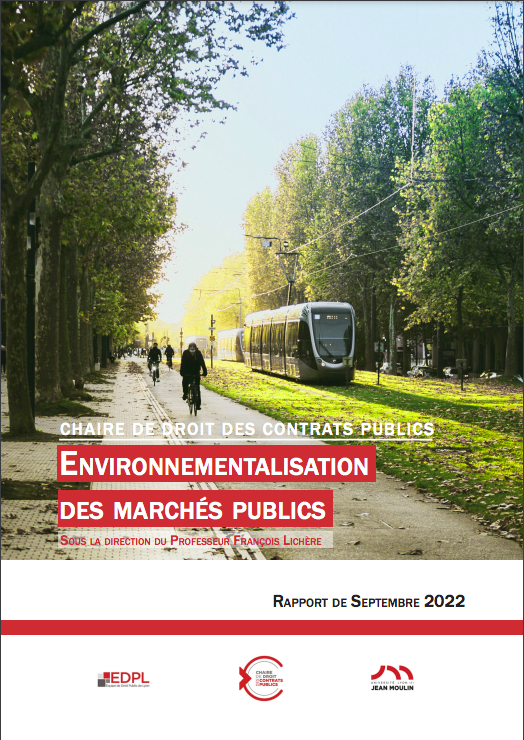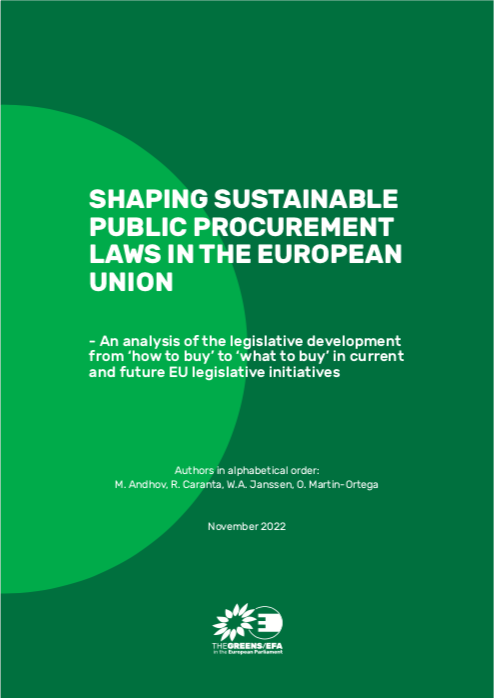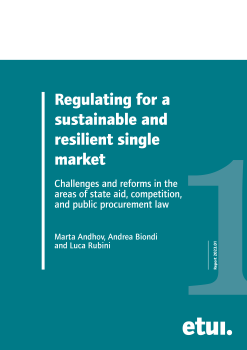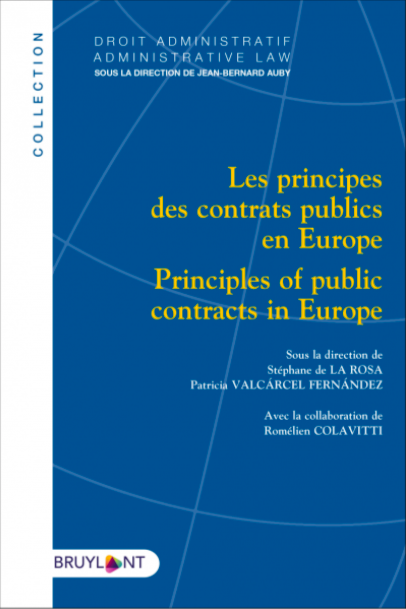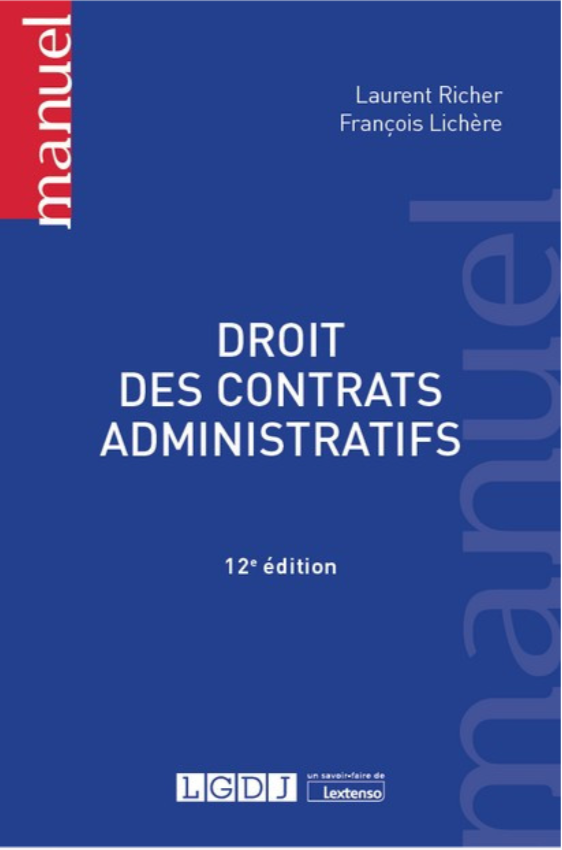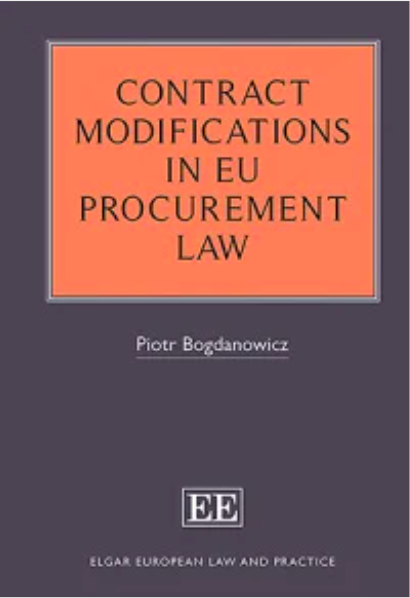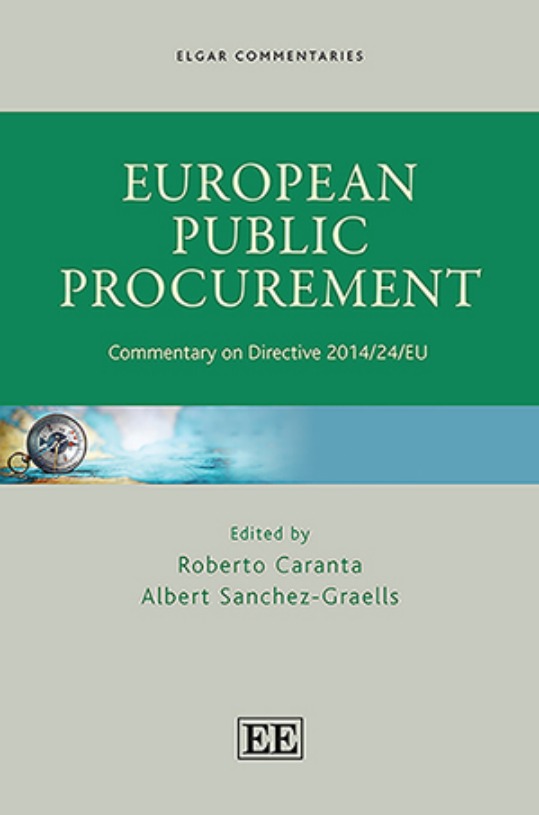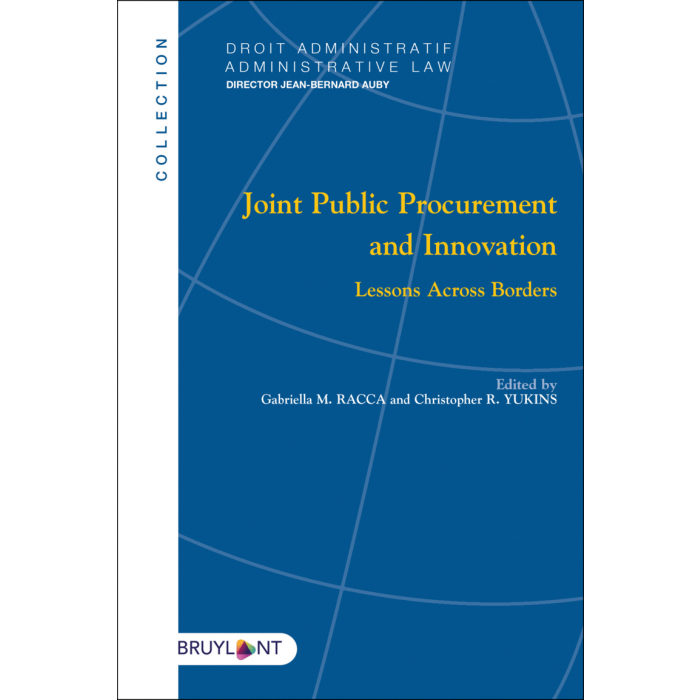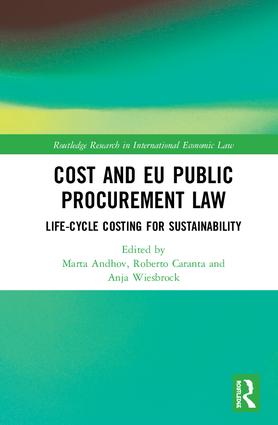The environmentalisation of public procurement: 4th research report by the Chair of Public Contract Law
La Chaire de droit des contrats publics (the Chair) of the University Jean Moulin Lyon 3, published in September 2022 the report ‘L’environnementalisation des marchés publics’, which is the result of a research project on the environmentalization of the legal framework of public procurement that took place between January and June 2022. The research work was carried out by the researchers of the Chair, under the direction of Professor and EPLG member Francois Lichere and is available on the website. The survey aimed to understand the construction of the legal framework for green public procurement and its adoption by public procurement actors in France. Semi-structured interviews and online questionnaires…
Shaping Sustainable Public Procurement Laws in the European Union
A new study by EPLG members Marta Andhov, Roberto Caranta, Willem A. Janssen and Olga Martin-Ortega on SHAPING SUSTAINABLE PUBLIC PROCUREMENT LAWS IN THE EUROPEAN UNION – An analysis of the legislative development from ‘how to buy’ to ‘what to buy’ in current and future EU legislative initiatives was published in November 2022. The study was conducted in light of the Greens/EFA Group’s long-standing demand to make sustainability criteria mandatory in public procurement by formulating concrete proposals for how the EU public procurement framework could be adapted or complemented in order to drive such sustainability considerations in public purchasing throughout the entire EU. Access Shaping SPP Laws in the…
Regulating for a sustainable and resilient single market Challenges and reforms in the areas of state aid, competition, and public procurement law
Prof. Marta Andhov contributed to the report ‘Regulating for a sustainable and resilient single market: Challenges and reforms in the areas of state aid, competition, and public procurement law’, published by Etui in February 2023.
Les principes des contrats publics en Europe / Principles of public contracts in Europe
The 1st edition of the book “Les principes des contrats publics en Europe / Principles of public contracts in Europe” has been published in March 2022 by Larcier Publisher. EPLG member Patricia Valcárcel Fernández co-edited the volume, with contributions by EPLG members Carina Risvig Hamer, Gabriella M. Racca and Roberto Caranta. This in-depth and bilingual (English / Français) international study, based on a five years research, contains a clear overview and an exhaustive inquiry of diversity of use of principles in the award and performance of public contracts. Based on a common methodology, this volume combines sources of international law, EU law (directives on public procurement and ECJ’S case law)…
Droit des Contrats Administratifs 12e édition
The 12th edition of the handbook “Droit des Contrats Administratifs” (Administrative Contract Law) has been published in October 2021, by the EPLG member François Lichère, Professor of Public Law at the University Jean Moulin Lyon 3, Director of the Chair of Public Contracts Law and consultant to French and foreign law firms, administrations and companies and Laurent Richer, Professor Emeritus of Public Law at the University of Paris 1 Panthéon-Sorbonne and lawyer specialist in public law (Richer et associés Law Firm). This handbook, which has already been used by several generations of students and practitioners, studies, on the one hand, the general regime of administrative contracts and, on the other,…
Contract Modifications in EU Procurement Law
EPLG member Piotr Bogdanowicz, Associate Professor at Warsaw University and Counsel at Clifford Chance, Poland, published the book Contract Modifications in EU Procurement Law in the Elgar European Law and Practice series. Contract Modifications in EU Procurement Law provides readers with a comprehensive overview of the process of contract modification under European Union (EU) procurement law. The book examines the origin of the regulations pertaining to modifications, the legal grounds for modification and limitations under current rules. In addition, the book outlines the legal effects of carrying out a modification breach under EU law. Key features of the book include: – an analysis of the criteria which must be…
European Public Procurement. Commentary on Directive 2014/24/EU
Co-edited by Roberto Caranta and Albert Sanchez-Graells, this detailed Commentary provides an authoritative interpretation of each provision in the main EU Directive on public procurement – Directive 2014/24/EU, and is rich in its critical analysis of the provisions of the 2014 Directive and the case-law. The Commentary also highlights the application problems and interpretative issues being raised in EU Member States, which in due time will make their way up to the CJEU or even require further legislative interventions.
Joint Public Procurement and Innovation. Lessons Across Borders
This book contributes to the development of life-cycle criteria tools and methodologies for public procurement in the EU. It collects both sector-crossing contributions analysing the most relevant theoretical and legal aspects, including both EU law and contract theory, and sector-specific contributions relating to some of the most important sustainable goods and services markets. The book starts with a chapter that discusses the different approaches to including sustainability considerations in buying decisions by both private and public purchasers, and then goes on to examine the EU law on LCC and how it is implemented in different Member States.
Cost and EU Public Procurement Law. Life-Cycle Costing for Sustainability
This book contributes to the development of life-cycle criteria tools and methodologies for public procurement in the EU. It collects both sector-crossing contributions analysing the most relevant theoretical and legal aspects, including both EU law and contract theory, and sector-specific contributions relating to some of the most important sustainable goods and services markets. The book starts with a chapter that discusses the different approaches to including sustainability considerations in buying decisions by both private and public purchasers, and then goes on to examine the EU law on LCC and how it is implemented in different Member States. These chapters address the challenges in balancing economic and sustainability objectives under…
Public Procurement and Aid Effectiveness. A Roadmap under Construction
This edited collection fills a significant gap in the literature by gathering contributions from the most prominent academics and practitioners of aid and procurement. It explores the economic, political and legal relationship between procurement and aid effectiveness in developing countries, and takes stock of current debates in the field.
Privacy Overview
This website uses cookies to improve your experience while you navigate through the website. Out of these, the cookies that are categorized as necessary are stored on your browser as they are essential for the working of basic functionalities of the website. We also use third-party cookies that help us analyze and understand how you use this website. These cookies will be stored in your browser only with your consent. You also have the option to opt-out of these cookies. But opting out of some of these cookies may affect your browsing experience.
Necessary cookies are absolutely essential for the website to function properly. These cookies ensure basic functionalities and security features of the website, anonymously.
| Cookie | Duration | Description |
|---|---|---|
| cookielawinfo-checkbox-advertisement | 1 year | Set by the GDPR Cookie Consent plugin, this cookie is used to record the user consent for the cookies in the "Advertisement" category . |
| cookielawinfo-checkbox-analytics | 11 months | This cookie is set by GDPR Cookie Consent plugin. The cookie is used to store the user consent for the cookies in the category "Analytics". |
| cookielawinfo-checkbox-functional | 11 months | The cookie is set by GDPR cookie consent to record the user consent for the cookies in the category "Functional". |
| cookielawinfo-checkbox-necessary | 11 months | This cookie is set by GDPR Cookie Consent plugin. The cookies is used to store the user consent for the cookies in the category "Necessary". |
| cookielawinfo-checkbox-others | 11 months | This cookie is set by GDPR Cookie Consent plugin. The cookie is used to store the user consent for the cookies in the category "Other. |
| cookielawinfo-checkbox-performance | 11 months | This cookie is set by GDPR Cookie Consent plugin. The cookie is used to store the user consent for the cookies in the category "Performance". |
| viewed_cookie_policy | 11 months | The cookie is set by the GDPR Cookie Consent plugin and is used to store whether or not user has consented to the use of cookies. It does not store any personal data. |
Functional cookies help to perform certain functionalities like sharing the content of the website on social media platforms, collect feedbacks, and other third-party features.
| Cookie | Duration | Description |
|---|---|---|
| __cf_bm | 30 minutes | This cookie, set by Cloudflare, is used to support Cloudflare Bot Management. |
Performance cookies are used to understand and analyze the key performance indexes of the website which helps in delivering a better user experience for the visitors.
Analytical cookies are used to understand how visitors interact with the website. These cookies help provide information on metrics the number of visitors, bounce rate, traffic source, etc.
Advertisement cookies are used to provide visitors with relevant ads and marketing campaigns. These cookies track visitors across websites and collect information to provide customized ads.
Other uncategorized cookies are those that are being analyzed and have not been classified into a category as yet.

